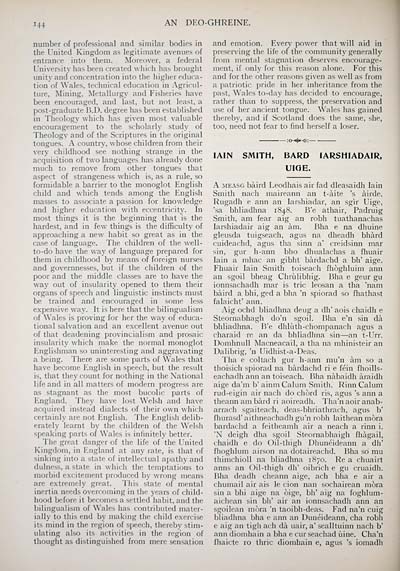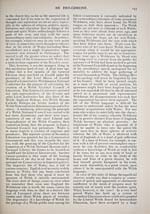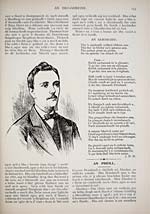Blair Collection > Deo-gréine
(168)
Download files
Complete book:
Individual page:
Thumbnail gallery: Grid view | List view

144
AN DEO-GHREINE.
number of professional and similar bodies in
the United Kingdom as legitimate avenues of
entrance into them. Moreover, a federal
University has been created which has brought
unity and concentration into the higher educa-
tion of Wales, technical education in Agricul-
ture, Mining, Metallurgy and Fisheries have
been encouraged, and last, but not least, a
post-graduate B.D. degree has been established
in Theology which has given most valuable
encouragement to the scholarly study of
Theology and of the Scriptures in the original
tongues. A country, whose children from their
very childhood see nothing strange in the
acquisition of two languages has already done
much to remove from other tongues that
aspect of strangeness which is, as a rule, so
formidable a barrier to the monoglot English
child and which tends among the English
masses to associate a passion for knowledge
and higher education with eccentricity. In
most things it is the beginning that is the
hardest, and in few things is the difficulty of
approaching a new habit so great as in the
case of language. The children of the well-
to-do have the way of language prepared for
them in childhood by means of foreign nurses
and governnesses, but if the children of the
poor and the middle classes are to have the
way out of insularity opened to them their
organs of speech and linguistic instincts must
be trained and encouraged in some less
expensive way. It is here that the bilingualism
of Wales is proving for her the way of educa-
tional salvation and an excellent avenue out
of that deadening provincialism and prosaic
insularity which make the normal monoglot
Englishman so uninteresting and aggravating
a being. There are some parts of Wales that
have become English in speech, but the result
is, that they count for nothing in the National
life and in all matters of modern progress are
as stagnant as the most bucolic parts of
England. They have lost Welsh and have
acquired instead dialects of their own which
i ei 1,1 inly are not English. The English delib-
erately harnt by the children of the Welsh
speaking parts of Wales is infinitely better.
The great danger of the life of the United
Kingdom, in England at any rate, is that of
sinking into a state of intellectual apathy and
dulness, a state in which the temptations to
morbid excitement produced by wrong means
tremely great. This state of mental
inertia needs overcoming in the years of child-
hood before it becomes a settled habit, and the
bilingualism of Wales has contributed mater-
ially to this end by making the child exercise
its mind in the region of speech, thereby stim-
ulating also its activities in the region of
thought as distinguished from mere sensation
and emotion. Every power that will aid in
preserving the life of the community generally
from mental stagnation deserves encourage-
ment, if only for this reason alone. For this
and for the other reasons given as well as from
a patriotic pride in her inheritance from the
past, Wales to-day has decided to encourage,
rather than to suppress, the preservation and
use of her ancient tongue. Wales has gained
thereby, and if Scotland does the same, she,
too, need not fear to find herself a loser.
IAIN SMITH, BARD IARSHIADAIR,
UIGE.
A measg bàird Leodhais air fad dleasaidh Iain
Smith nach maireann an t-àite 's àirde.
Rugadh e ann an Iarshiadar, an sgir Uige,
'sa bhliadhna 1S48. B'e athair, Padruig
Smith, am fear aig an robh tuathanachas
Iarshiadair aig an àm. Bha e na dhuine
gleusda tuigseach, agus na dheadh bhàrd
cuideachd, agus tha sinn a' creidsinn mar
sin, gur h-ann bho dhualachas a fhuair
Iain a mhac an gibht bàrdachd a bh' aige.
Fhuair Iain Smith toiseach fhòghluim ann
an sgoil bheag Chrulibhig. Bha e geur gu
ionnsachadh mar is trie leosan a tha 'nam
bàird a bhi, ged a bha 'n spiorad so fhathast
falaicht' ann.
Aig ochd bliadhna deug a dh' aois chaidh e
Steornabhagh do'n sgoil. Bha e'n sin dà
bhliadhna. B'e dhlùth-chompanach agus a
charaid re an da bhliadhna sin — an t-Urr.
Domhnull Macneacail, a tha na mhinisteir an
Dalibrig, n Uidhist-a-Deas.
Tha e coltach gur h-ann mu'n àm so a
thoisich spiorad na bàrdachd ri e fein fhoills-
eachadh ann an toiseach. Bha nàbaidh àraidh
aige da'm b' ainm Calum Smith. Rinn Calum
rud-eigin air nach do chord ris, agus 's ann a
theann am bàrd ri aoireadh. Tha'n aoir anab-
arrach sgaiteach, deas-bhriathrach, agus b'
fhurasd'aithneachadh gu'n robh laitheanmòra
bardachd a feitheamh air a neach a rinn i.
'N deigh dha sgoil Steornabhaigh fhàgail,
chaidh e do Oil-thigh Dhunèideann a dh'
fhoghlum airson na dotaireachd. Bha so mu
thimchioll na bliadhna 1S70. Re a chuairt
aims an Oil-thigh dh' oibrich e gu cruaidh.
Bha deadh cheann aige, ach bha e air a
chumail air ais le cion nan sochairean mora
sin a bhi aige na òige, bh' aig na foghlum-
aichean sin bh' air an ionnsachadh ann an
sgoilean mora 'n taoibh-deas. Fad na'n cuig
bliadhna bha e ann an Dunèideann, cha robh
e aig an tigh ach dà uair, a' sealltuinn nach b'
ann diomhain a bha e cur seachad ùine. Cha'n
fhaicte ro thric diomhain e, agus 's iomadh
AN DEO-GHREINE.
number of professional and similar bodies in
the United Kingdom as legitimate avenues of
entrance into them. Moreover, a federal
University has been created which has brought
unity and concentration into the higher educa-
tion of Wales, technical education in Agricul-
ture, Mining, Metallurgy and Fisheries have
been encouraged, and last, but not least, a
post-graduate B.D. degree has been established
in Theology which has given most valuable
encouragement to the scholarly study of
Theology and of the Scriptures in the original
tongues. A country, whose children from their
very childhood see nothing strange in the
acquisition of two languages has already done
much to remove from other tongues that
aspect of strangeness which is, as a rule, so
formidable a barrier to the monoglot English
child and which tends among the English
masses to associate a passion for knowledge
and higher education with eccentricity. In
most things it is the beginning that is the
hardest, and in few things is the difficulty of
approaching a new habit so great as in the
case of language. The children of the well-
to-do have the way of language prepared for
them in childhood by means of foreign nurses
and governnesses, but if the children of the
poor and the middle classes are to have the
way out of insularity opened to them their
organs of speech and linguistic instincts must
be trained and encouraged in some less
expensive way. It is here that the bilingualism
of Wales is proving for her the way of educa-
tional salvation and an excellent avenue out
of that deadening provincialism and prosaic
insularity which make the normal monoglot
Englishman so uninteresting and aggravating
a being. There are some parts of Wales that
have become English in speech, but the result
is, that they count for nothing in the National
life and in all matters of modern progress are
as stagnant as the most bucolic parts of
England. They have lost Welsh and have
acquired instead dialects of their own which
i ei 1,1 inly are not English. The English delib-
erately harnt by the children of the Welsh
speaking parts of Wales is infinitely better.
The great danger of the life of the United
Kingdom, in England at any rate, is that of
sinking into a state of intellectual apathy and
dulness, a state in which the temptations to
morbid excitement produced by wrong means
tremely great. This state of mental
inertia needs overcoming in the years of child-
hood before it becomes a settled habit, and the
bilingualism of Wales has contributed mater-
ially to this end by making the child exercise
its mind in the region of speech, thereby stim-
ulating also its activities in the region of
thought as distinguished from mere sensation
and emotion. Every power that will aid in
preserving the life of the community generally
from mental stagnation deserves encourage-
ment, if only for this reason alone. For this
and for the other reasons given as well as from
a patriotic pride in her inheritance from the
past, Wales to-day has decided to encourage,
rather than to suppress, the preservation and
use of her ancient tongue. Wales has gained
thereby, and if Scotland does the same, she,
too, need not fear to find herself a loser.
IAIN SMITH, BARD IARSHIADAIR,
UIGE.
A measg bàird Leodhais air fad dleasaidh Iain
Smith nach maireann an t-àite 's àirde.
Rugadh e ann an Iarshiadar, an sgir Uige,
'sa bhliadhna 1S48. B'e athair, Padruig
Smith, am fear aig an robh tuathanachas
Iarshiadair aig an àm. Bha e na dhuine
gleusda tuigseach, agus na dheadh bhàrd
cuideachd, agus tha sinn a' creidsinn mar
sin, gur h-ann bho dhualachas a fhuair
Iain a mhac an gibht bàrdachd a bh' aige.
Fhuair Iain Smith toiseach fhòghluim ann
an sgoil bheag Chrulibhig. Bha e geur gu
ionnsachadh mar is trie leosan a tha 'nam
bàird a bhi, ged a bha 'n spiorad so fhathast
falaicht' ann.
Aig ochd bliadhna deug a dh' aois chaidh e
Steornabhagh do'n sgoil. Bha e'n sin dà
bhliadhna. B'e dhlùth-chompanach agus a
charaid re an da bhliadhna sin — an t-Urr.
Domhnull Macneacail, a tha na mhinisteir an
Dalibrig, n Uidhist-a-Deas.
Tha e coltach gur h-ann mu'n àm so a
thoisich spiorad na bàrdachd ri e fein fhoills-
eachadh ann an toiseach. Bha nàbaidh àraidh
aige da'm b' ainm Calum Smith. Rinn Calum
rud-eigin air nach do chord ris, agus 's ann a
theann am bàrd ri aoireadh. Tha'n aoir anab-
arrach sgaiteach, deas-bhriathrach, agus b'
fhurasd'aithneachadh gu'n robh laitheanmòra
bardachd a feitheamh air a neach a rinn i.
'N deigh dha sgoil Steornabhaigh fhàgail,
chaidh e do Oil-thigh Dhunèideann a dh'
fhoghlum airson na dotaireachd. Bha so mu
thimchioll na bliadhna 1S70. Re a chuairt
aims an Oil-thigh dh' oibrich e gu cruaidh.
Bha deadh cheann aige, ach bha e air a
chumail air ais le cion nan sochairean mora
sin a bhi aige na òige, bh' aig na foghlum-
aichean sin bh' air an ionnsachadh ann an
sgoilean mora 'n taoibh-deas. Fad na'n cuig
bliadhna bha e ann an Dunèideann, cha robh
e aig an tigh ach dà uair, a' sealltuinn nach b'
ann diomhain a bha e cur seachad ùine. Cha'n
fhaicte ro thric diomhain e, agus 's iomadh
Set display mode to: Large image | Transcription
Images and transcriptions on this page, including medium image downloads, may be used under the Creative Commons Attribution 4.0 International Licence unless otherwise stated. ![]()
| Early Gaelic Book Collections > Blair Collection > Deo-gréine > (168) |
|---|
| Permanent URL | https://digital.nls.uk/76699541 |
|---|
| Description | A selection of books from a collection of more than 500 titles, mostly on religious and literary topics. Also includes some material dealing with other Celtic languages and societies. Collection created towards the end of the 19th century by Lady Evelyn Stewart Murray. |
|---|
| Description | Selected items from five 'Special and Named Printed Collections'. Includes books in Gaelic and other Celtic languages, works about the Gaels, their languages, literature, culture and history. |
|---|

